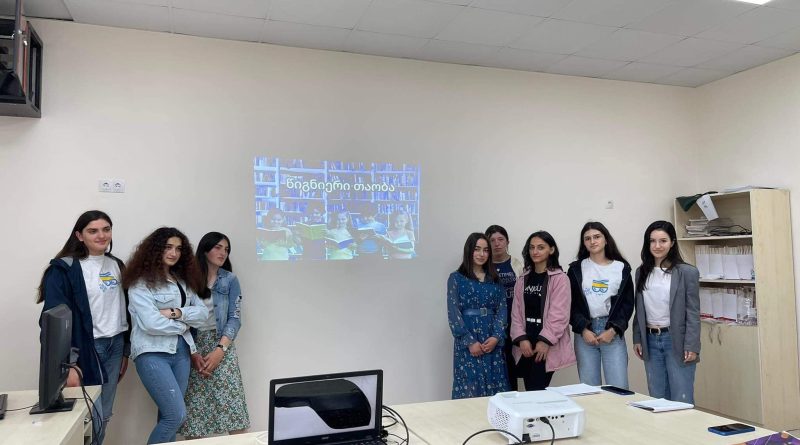Tsalka Youth Idea
For several years now, “Tsalka Youth Idea” has been active in Tsalka municipality. Its members engage in daily activities that involve identifying problems and searching for solutions on the ground.
A group of young people from Tsalka came together under the program of the “European Fund” to form an initiative group. Currently, the group comprises about 10 members aged between 15 and 21, who collaborate to tackle challenges within their community. The group regularly conducts surveys to gather information and on December 5, 2021, Members of Youth Idea interviewed 100 individuals in Tsalka. From the survey, three priority issues were identified:
extracurricular activities for youth;
cultural events;
waste management;
Nana Tsikvadze, assistant of the youth integration program of the “European Foundation”, notes the opportunities that young people have on the ground.
“Young people should not be considered only as the future and potential citizens of the country. They have needs, things to say and many interesting ideas here and now. If we give them appropriate opportunities, knowledge, and resources – they can offer very interesting and innovative solutions to current problems in society. That is why it is important to have such initiative groups at the local level and to support their activities.”
Tsalka Youth Idea works on such issues as protection of homeless animals, quality of education and waste management. A number of important steps have already been taken in this direction. Today, they actively cooperate with relevant organizations to sterilize homeless dogs.
The team is multi-ethnic and the activities of its members are diverse. They are trying to cover all schools of Tsalka and involve in their projects. The proof of this is the holding of the conference of Tsalka schools. Within its framework, students wrote essays on the UN Sustainable Development Goals. After the internal school competition, the winners presented their papers at the mentioned conference.
The launch of the Musical Brightness project in Sameba village was a significant event. With the assistance of these young individuals, a musical study group was established in the village and equipped with musical instruments. This project provided an opportunity for young people to master various musical instruments. Moreover, Youth Idea financed the Literate sGeneration project and the Tsalka Youth Chess Club.
There are frequent meetings with local young people. The members visit various villages to provide information on both current and upcoming projects. They even announce grant competitions and give others a chance to turn their ideas into action.
Each year, the members of “Tsalka Youth Idea” choose different managers from various backgrounds, and even the members themselves change. The research of needs commences, and each new team serves one crucial goal – to strengthen civil society on the local level and implement vital projects.
According to Nana Tsikvadze, the “Tsalka Youth Idea” members are currently summarizing their completed projects and preparing reports. They have also noted some challenges faced by the team this year, such as communication difficulties with certain schools due to adverse weather conditions.
Iako Markoidze, one of the members, talks about the role and efficiency of the work of “Tsalka Youth Idea”:
“Thanks to the Tsalka Youth Idea, many young people were given the chance to put their ideas into action and contribute to the growth and betterment of their community. Being a member of this group, I can attest that the experience was both enriching and engaging. The youth idea of Tsalka proved to me and other young people that we have the power to effect positive changes in our community and that our participation, commitment, and initiatives are crucial for the advancement of Tsalka”.
Author: Guranda Phutkaraya
Azerbaijani translation: Chichak Guseynova
English translation: Tamar Cherkezishvili
The article was created with the support of the Civil Society Institute, within the framework of the project " Civil Society Initiative: Sustainable, Open and Accountable Civil Society, Organizations for the Development of Georgia" funded by the European Union and the Konrad Adenauer Foundation. Kvemo Kartli Media is fully responsible for its content and it may not reflect the views of the European Union or the Konrad Adenauer Foundation. The project is implemented by a consortium led by the Konrad Adenauer Foundation (KAS) together with the following non-governmental organizations – Center for Strategic Research and Development of Georgia (CSRDG), Civil Society Institute (CSI), Counseling and Training Center (CTC), Education Development and Employment Center (EDEC) and European Institute of Policy (IEP).
QvemoQartli.ge
You can use the material only by referring to the site
